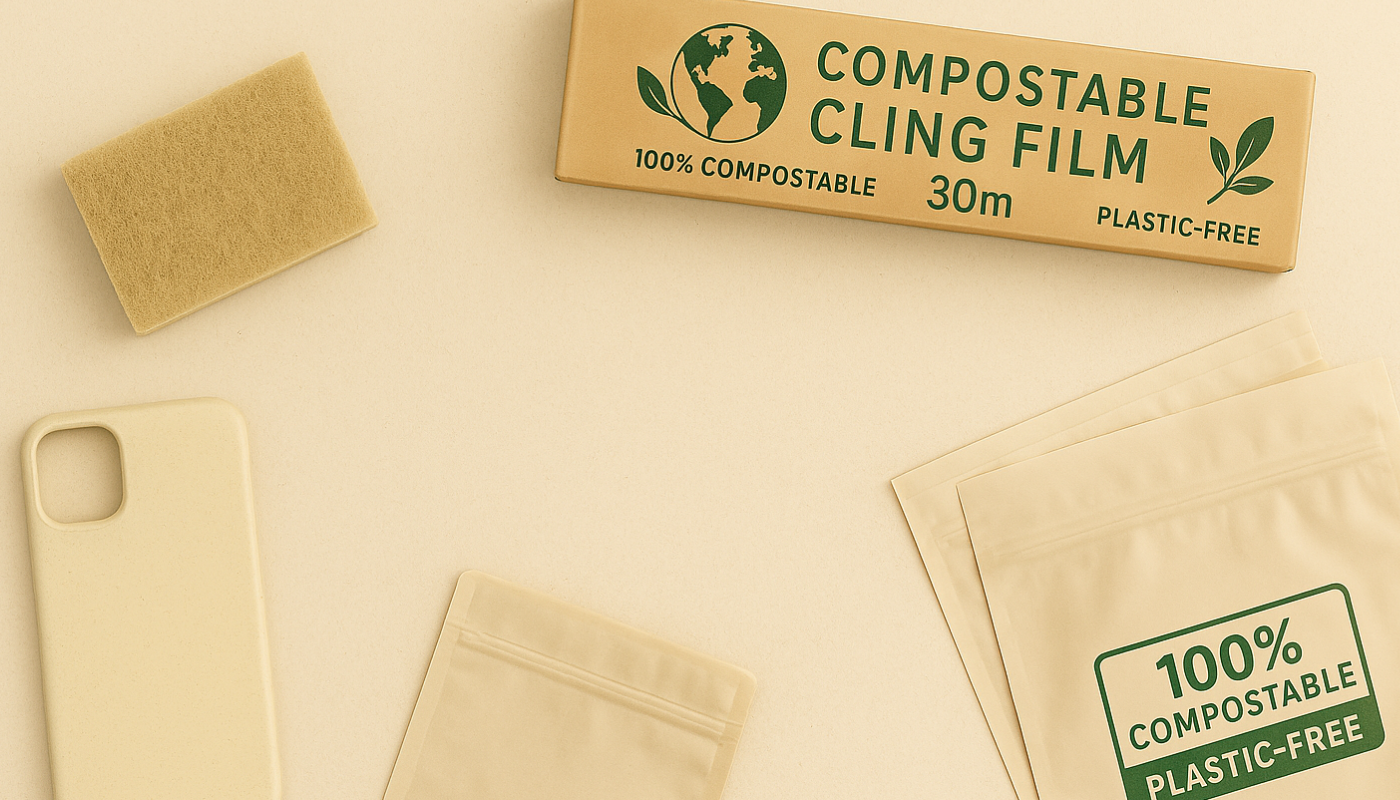The Ultimate Guide to Compostable Products in the UK
Introduction to Compostable Products
The UK is in the middle of a sustainability shake-up. Everywhere you look, people are swapping single-use plastics for greener options, from coffee cups to shopping bags. But one area that’s making waves is compostable products—everyday items designed to break down naturally, leaving behind nothing but nutrient-rich soil.
But here’s the big question: are they really the answer to our plastic problem? Let’s dig in.
TL;DR: This guide explains what compostable products really are in the UK, how they differ from biodegradable and recyclable items, why UK regulations and consumer behaviour are shifting accordingly, what types of compostable goods (packaging, tableware, everyday essentials) are available, how to spot genuine certified products (look for EN 13432, OK Compost, Seedling logos), and what the main benefits and challenges are for home users and businesses. It finishes with advice on switching to compostables, choosing trusted UK brands and what the future of the market looks like.
What Are Compostable Products?
Compostable products are made from plant-based materials, such as cornstarch, sugarcane, or bamboo. Unlike plastics, which take centuries to disappear, compostables break down in months when exposed to the right composting conditions. They don’t leave behind harmful microplastics or toxins—they simply return to the earth.
Think of it this way: plastic is like that one guest who never leaves the party, while compostables are polite guests who clean up after themselves before heading home.
Difference Between Compostable, Biodegradable, and Recyclable
Here’s where it gets confusing—people often mix these terms up.
- Compostable: Breaks down within 90–180 days in composting conditions, leaving only natural elements.
- Biodegradable: Decomposes eventually but may take decades and still leaves harmful residue.
- Recyclable: Can be reprocessed into something new, but doesn’t reduce waste at its source.
So, while all compostable products are biodegradable, not all biodegradable products are truly compostable.
Why the UK is Moving Towards Compostable Solutions
The UK generates around 2.5 million tonnes of plastic waste every year, and less than 50% of it gets recycled. Landfills and oceans are overflowing, and microplastics have been found in everything from fish to bottled water.
To tackle this, the government introduced the Plastic Packaging Tax in 2022, charging companies that don’t include at least 30% recycled plastic in their packaging. Combined with bans on items like plastic straws and cutlery, this has opened the door for compostable alternatives.
The Growing Demand for Compostable Products in the UK
Environmental Awareness and Consumer Behaviour
UK shoppers are voting with their wallets. According to WRAP, over 70% of consumers say they try to avoid plastic packaging where possible. People don’t just want greener products—they expect them.
Government Policies and Regulations
From the 2020 plastic straw ban to the new Extended Producer Responsibility (EPR) rules rolling out in 2025, policies are forcing businesses to rethink packaging. Compostable solutions are quickly becoming the easiest way to stay compliant.
The Role of Businesses in Sustainability
It’s not just law—it’s branding. Companies like Costa Coffee, Pret A Manger, and Co-op have switched to compostable or recyclable packaging to align with consumer expectations. For small businesses, using compostable packaging can be a smart way to stand out.
Types of Compostable Products Available
Compostable Packaging
- Cling Film & Food Wraps: Plant-based wraps that seal food as well as plastic, without the long-term waste.
- Compostable Bags & Bin Liners: Perfect for collecting food scraps or garden waste and dropping them into council bins.
Compostable Tableware
- Plates, Bowls, and Cutlery: Made from palm leaves, sugarcane, or cornstarch. Popular at festivals and catering events.
- Cups and Lids: Many UK cafés now serve drinks in compostable cups lined with plant starch.
Compostable Everyday Essentials
- Toothbrushes: Bamboo-handled brushes that can be composted after removing bristles.
- Ziplock Bags: Newer designs are both resealable and compost-friendly.
Benefits of Using Compostable Products
- Reducing Plastic Waste: The UK uses billions of plastic items yearly. Compostables help cut that number drastically.
- Lower Carbon Footprint: Manufacturing compostables typically uses renewable resources, reducing reliance on fossil fuels.
- Supporting the Circular Economy: Compostable waste returns to the soil, improving soil health rather than filling landfills.
- Health and Safety: Unlike some plastics, compostables don’t leach harmful chemicals into food.
Challenges with Compostable Products
- Higher Costs Compared to Plastics: Compostables can cost 20–50% more due to smaller production scales.
- Limited Composting Facilities in the UK: Not all councils accept compostable packaging, so many end up in general waste.
- Consumer Confusion with Labelling: Terms like “biodegradable” often mislead shoppers into thinking items are compostable when they aren’t.
How to Identify Genuine Compostable Products
- Certification Labels: Look for EN13432, OK Compost, or Seedling logo to confirm compliance.
- Trusted UK Brands: Companies like Vegware and Boring Basics clearly state composting requirements.
- Avoid Greenwashing: Be wary of vague claims like “eco-friendly” without certifications.
Composting at Home vs. Industrial Composting
Home Composting Guidelines
Great for food scraps, garden waste, and certain compostable bags. But many products (like thick cups) won’t break down fully in a home compost bin.
What Belongs in Industrial Composting Facilities
Heavier-duty items like cutlery, plates, and takeaway containers. These need higher heat to decompose.
Local Council Collection in the UK
Not all councils collect compostables. London, Manchester, and Edinburgh have food waste collections, but coverage varies. Always check local rules before tossing items in the bin.
Environmental Impact in the UK
Plastic pollution costs the UK economy around £500 million annually in clean-up and damage to ecosystems. Switching to compostables could significantly reduce this.
A 2023 study found that if every UK household swapped just 10 plastic items for compostable alternatives each month, the country could cut 30,000 tonnes of plastic waste annually. That’s a huge win for both people and the planet.
Case Studies of UK Businesses
- Pret A Manger: Switched to compostable cups and lids across many UK branches.
- Co-op: Introduced compostable carrier bags in all stores, which double as food waste caddy liners.
- Independent cafés in London: Many now advertise their “100% compostable takeaway packaging” as a selling point.
These changes not only reduce waste but also create a positive, eco-friendly brand image.
Cost Analysis: Compostables vs Plastics
Yes, compostables are more expensive—sometimes double the price. For example:
- A standard plastic takeaway box: 5–7p
- A compostable takeaway box: 10–14p
But businesses often recoup costs by charging a small green fee or using sustainability to attract eco-conscious customers. In the long term, it can be a profitable investment.
Best UK Brands for Compostable Products
- Supermarkets: Tesco, Sainsbury’s, and Co-op now stock compostable bags and wraps.
- Independent Brands: Vegware, Boring Basics, and EcoCraft lead the UK compostable scene.
- Online Marketplaces: Amazon UK and eco-shops like Ethical Superstore.
For product-level detail, see: Are Compostable Cling Film Really Compostable?, our guide to phone cases, and our explainer on ziplock bags.
How Businesses Can Switch to Compostable Solutions
- Restaurants and Cafés: Switch takeaway packaging, cutlery, and straws.
- Offices: Compostable bin liners, catering supplies, and lunch packaging.
- Green Branding: Use “eco-friendly packaging” as part of your marketing strategy. Consumers love brands that align with their values.
Future of Compostable Products in the UK
- Innovations in Materials: Seaweed films, mushroom leather, and algae-based plastics are on the horizon.
- Government Incentives: More tax breaks and grants are expected for businesses adopting compostables.
- Consumer Adoption: With Gen Z and Millennials leading the eco-movement, demand will only grow stronger.
Conclusion
Compostable products aren’t just a passing trend—they’re a practical solution to one of the UK’s biggest environmental challenges. While costs and infrastructure are hurdles, the benefits far outweigh the downsides. By making small switches—whether at home or in business—you can help push the UK towards a greener, waste-free future. Read more articles about composting and biodegradables on the Boring Basics blog.
Frequently Asked Questions
Yes, because they break down naturally without polluting the environment, unlike plastics that last centuries.
Some items, like bags, can be composted, but sturdier items usually need industrial composting.
Yes—most are certified food-safe and made from natural materials.
Biodegradable just means it will eventually break down. Compostable means it does so quickly and safely.
Major supermarkets, eco-friendly brands like Boringbasics.uk, and online marketplaces stock a growing variety.

